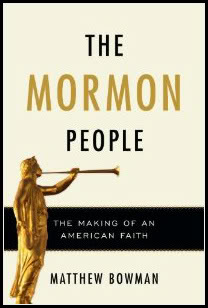Offer extra credit and they shall come! My students were offered some extra credit to read Matthew Bowman‘s blog entry on teaching Mormonism in the US history survey course and incorporate their thoughts on Joseph Smith’s writings on plural marriage in 1842 (and apologies to all for the typographical error when referencing the name of the church – we know it’s the Church of Jesus Christ of Latter-day Saints and not the Church of Latter-Day Saints). Here, Matt graciously responds to their comments.
 The students here mostly invoke a topic that I dealt with only glancingly: that is, Mormon polygamy. Joesph Smith began practicing polygamy in earnest in 1841, and over the next two years married some thirty women. Though he kept the practice largely secret, by 1844 he had initiated multiple of his male followers and many more women into what they called “the Principle.” In 1852, in Utah, Smith’s successor Brigham Young made the practice public, and for two generations the Mormons practiced plural marriage. Some twenty percent of Mormons were involved in a polygamous relationship at the practice’s height, around 1880. But only ten years later, the president of the church announced that the practice would cease (though it took some dozen years to die out among the mainstream Mormon church completely). The Mormons had come under intense pressure: prosecutions, arrests, and the threat of seizure of their property stamped out the practice.
The students here mostly invoke a topic that I dealt with only glancingly: that is, Mormon polygamy. Joesph Smith began practicing polygamy in earnest in 1841, and over the next two years married some thirty women. Though he kept the practice largely secret, by 1844 he had initiated multiple of his male followers and many more women into what they called “the Principle.” In 1852, in Utah, Smith’s successor Brigham Young made the practice public, and for two generations the Mormons practiced plural marriage. Some twenty percent of Mormons were involved in a polygamous relationship at the practice’s height, around 1880. But only ten years later, the president of the church announced that the practice would cease (though it took some dozen years to die out among the mainstream Mormon church completely). The Mormons had come under intense pressure: prosecutions, arrests, and the threat of seizure of their property stamped out the practice.
How should we think of Mormon polygamy? In one sense, polygamy was a deeply conservative principle: it sought to bind the Mormon community together through marriage ties, much as medieval European nobility used marriage to forge alliances and peace. Mormon leaders married into each others’ families, and due precisely to its radicalism polygamy bound those who practiced it intensely to the Mormon community: there was no going back once you had taken a third or fourth wife. Polygamy was closely governed by church leadership to ensure that it was practiced with all the rectitude these Victorians could muster. But while it strengthened the Mormon community it also turned them against that society they had emerged from: Americans despised polygamy, understood the community it produced to be immoral, and also undemocratic. It was bound in their minds to tyranny, sexual repression, and even racial decay. In this sense, then, polygamy embodies my larger point about Mormonism generally: the ways it embodies but also protests American culture.

